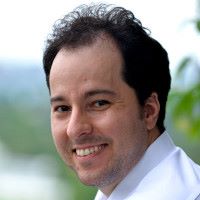I am a postdoctoral researcher sponsored by the Marie-Curie Global fellowship to contribute to the mission Climate Neutral and Smart Cities in collaboration with the Delft University of Technology and Carnegie Mellon University.
About
I have more than 12 years of research experience in building energy efficiency and urban overheating. To investigate their connections, I have integrated sensing, physics, and artificial intelligence across multiple scales, different climates, and various urban morphologies. The sensing methods are automatic weather stations, meteorological flux towers, and infrared thermal cameras. The data collected via these methods serves to either validate physics-based models or train data-driven models. Using the models, I aim to evaluate various strategies to counteract urban overheating and reduce the carbon footprint in cities.
Background
I received my Bachelor and Master degree in Computer Science at the University of Geneve (Switzerland). At the end of my Master, I wrote a thesis about humain-machine interactions using brain waves.
As a first professional experience in research, I worked at the Energy Center of the Swiss Federal Institute of Technology Lausanne. I was hired in a project to study energy flows in Switzerland. The project highlighted the significant role of buildings in the country’s total energy consumption. I also observed how computer science and information technologies can help develop smarter and more sustainable cities.
The knowledge I acquired at the Energy Center motivated my decision to work as a research engineer at the Masdar Institute of Science and Technology (Abu Dhabi, United Arab Emirates). My research, sponsored first by the Executive Affairs Authority of Abu Dhabi and subsequently by the MIT & MI cooperative program, focused on investigating co-simulation techniques using physics-based urban canopy and building energy models.
Later, I moved to Singapore to purse my career in academia at the National University of Singapore .
- I was first hired as a Research Fellow to work on urban microclimate modelling under the sponsorship of the Energy & Environmental Sustainable Solutions research program.
- I was then granted the NUS Research Scholarship and the President’s Graduate Fellowship to do a Ph.D. in the department of Building Science. During my Ph.D., I further studied physics-based methods to simulate thermal interactions between buildings and their outdoor environment. The main innovation of my Ph.D. work was to use computational fluid dynamics to perform simulations of the outdoor built environment. The simulations allowed us to improve the spatial resolution, enabling a building-scale assessment of how anthropogenic heat releases and urban overheating countermeasures impact the outdoor temperature. To validate estimates of outdoor conditions obtained by computational fluid dynamics, I conducted a field experiment in the university campus of the National University Singapore under the support of the University Campus Infrastructure and the Office of Deputy President. Results of my Ph.D. study were used in Virtual Singapore, a research program sponsored by the National Research Foundation, the Singapore Land Authority, and the Government Technology Agency.
- Following my Ph.D., I worked as a senior research fellow at the Berkeley Education Alliance for Research in Singapore. My research focused on observations of the outdoor built environment using infrared thermography.
Apart from research, I have practiced martial arts for several years. Since I traveled to Iceland, I have interests in hiking. I am very proud to be the father of a lovely little girl.
Current projects
BEAM
The Baselining, Evaluating, Action, and Monitoring (BEAM) project is part of the CoolNUS initiative by the NUS president, University Campus Infrastructure (UCI), and College of Design and Engineering (CDE) to develop a test bed for urban microclimate sensing and modelling.
SCIENCES
The Smart City Innovations and Experiments using New Climate and Energy Simulations (SCIENCES) project is funded by the European commission and managed by the Delft University of Technology in association with Carnegie Mellon University.
